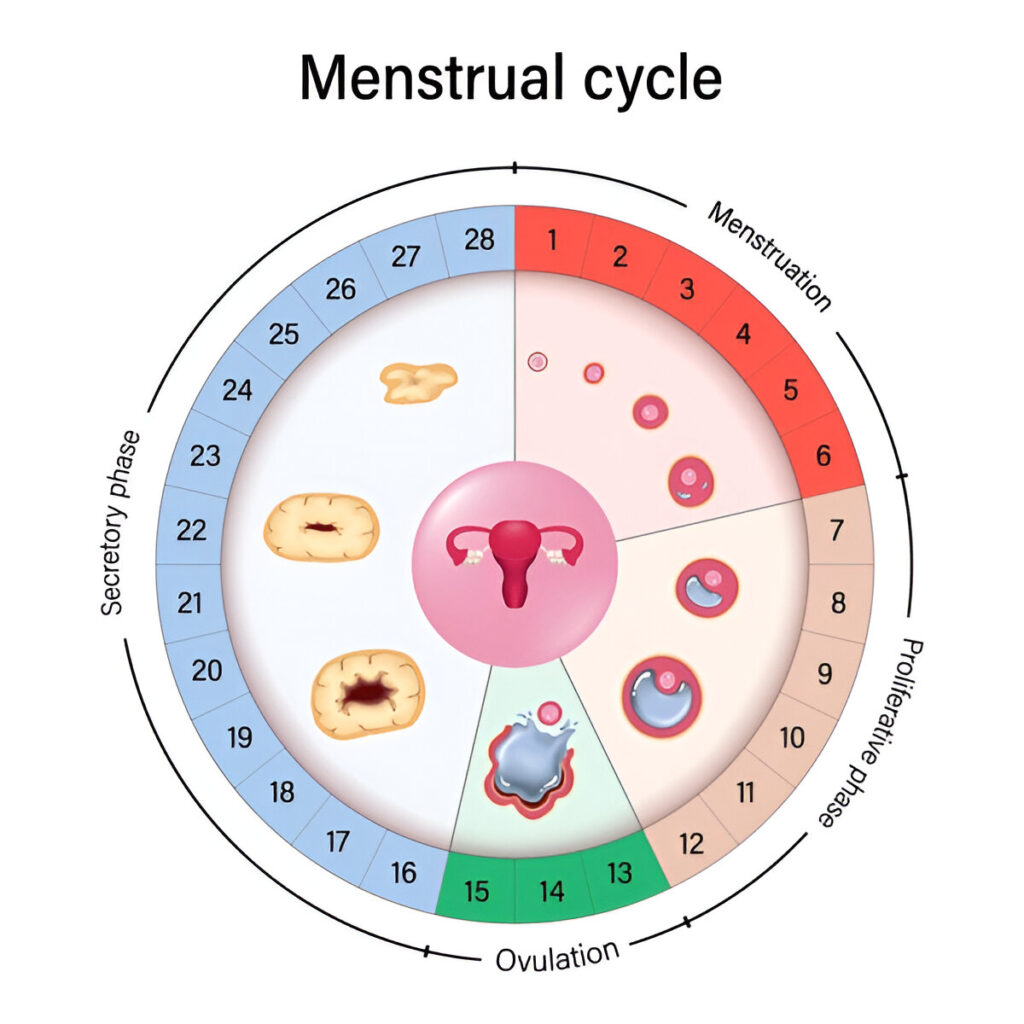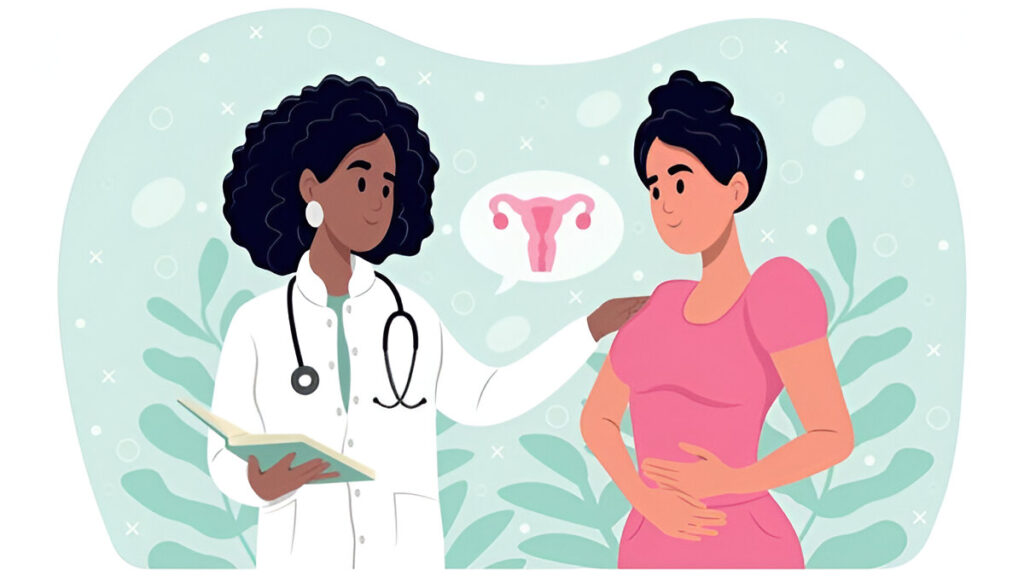Nearly 80% of women endure period pain. Cramps, headaches, mood changes, and bloating may disrupt everyday life for many. Some women can manage their periods, but others struggle with these symptoms. Knowing period symptoms helps you prepare and handle them.
In this article, you will discover what women feel before and throughout their periods. You may feel more comfortable and return to your routine with these practical recommendations for managing these symptoms. Knowing what to anticipate might help with period cramps, bloating, and mood swings. Learn about menstruation symptoms and how to treat them.
What Is Menstruation?

Menstruation is normal for women. The vagina bleeds when the uterine lining sheds. Distinct individuals have distinct monthly cycles, usually lasting 3–7 days. Menstruation helps prepare the body for pregnancy.
Hormonal shifts induce cramping, bloating, and mood swings. Estrogen and progesterone fluctuate monthly. Many symptoms occur when these hormones diminish because the body sheds the uterine lining. Understanding menstrual symptoms can help us better control them.
Common Symptoms of Periods

Numerous women suffer symptoms before and during their period each month. Hormonal changes prepare the body for menstruation. Some women have no symptoms, while others suffer pain that affects their everyday lives. Here are some typical period symptoms and how to treat them.
Menstrual Cramps (Dysmenorrhea)
Menstrual cramps are acute or mild aches in the lower abdomen that might start a day or two before the period and linger for several days. One of the most frequent menstrual symptoms is cramping.
Cramps are induced by prostaglandins, which constrict the uterus to lose its lining. Stronger contractions cause greater agony.
- Use over the counter painkillers like ibuprofen.
- Relax muscles with a heating pad or warm bath.
- Relieve stress with yoga or deep breathing.
Breast Tenderness
Another typical symptom of periods is breast discomfort. A dull, heavy pain in the breasts may occasionally spread to the armpits.
Post ovulation progesterone levels rise, causing breast milk glands to swell and become sensitive.
- To manage, use a supportive bra, particularly during exercise.
- Limit caffeine, which may aggravate breast discomfort.
- If pain is extreme, use OTC painkillers.
3.3 Acne and Skin Breakouts
Many women experience skin breakouts in the days before their period. Hormonal changes enhance skin sebum production.
Research indicates that 44% of women have acne flare ups before their menstruation.
- Use a light skincare regimen with a gentle cleanser and oil free moisturizer to manage.
- Use over the counter acne medications like salicylic acid or benzoyl peroxide.
- Avoid touching your face to avoid bacterial spread.
Fatigue
Periods may cause fatigue and poor energy levels. The drop in serotonin, the “feel good” hormone, may lower energy levels.
A balanced diet includes fruits, vegetables, and whole grains for increased energy.
- Walk for circulation and tiredness relief.
- Regular sleep schedules promote excellent sleep hygiene.
Bloating and Water Retention
Bloating (swollen belly) is a frequent symptom before and during your period. It typically causes water retention in tightening garments.
Menstrual cycle hormonal changes might induce water retention and bloating.
- Reduce salt intake to reduce water retention.
- To hydrate and drain extra fluids, drink plenty of water.
- Avoid sodium laden processed meals.
Lower Back Pain
Lower back discomfort is joint in women and is typically caused by menstrual cramps. Uterus contractions may cause lower back discomfort.
- Stretching activities, such as yoga, may alleviate back discomfort.
- Reduce pain using ibuprofen.
- Soothe lower back muscles with a heating pad.
Mood Swings and Irritability
Periods can cause mood swings, irritation, and emotional shifts. Estrogen and progesterone drops can cause mood swings.
- To handle stress, use mindfulness and relaxation practices.
- Continue exercising to release endorphins and increase mood.
- Discuss treatment options with a doctor for severe instances like PMDD.
Gastrointestinal Issues
Some women may develop constipation or diarrhea during their menstruation. These digestive difficulties are caused by hormonal changes that damage gut muscles.
According to a 2014 research, 73% of women report gastrointestinal problems, including constipation or diarrhea, during their period.
- To manage digestion, consume a high fiber diet.
- Drink water to stay hydrated.
- Consult a doctor for severe or persistent symptoms.
Headaches or Migraines
Headaches, especially migraines, are frequent period symptoms. Headaches can result from the decline in estrogen before menstruation.
To manage a headache, use pain medicines such as ibuprofen or acetaminophen.
- Daily water consumption keeps you hydrated.
- Avoid coffee and chocolate, which may cause headaches, particularly now.
Health Conditions That Can Worsen Period Symptoms
Specific health issues might worsen period symptoms, including discomfort, bleeding, and other consequences. Knowing about these disorders allows you to seek medical help if your symptoms worsen. The most prevalent illnesses that aggravate menstruation symptoms are listed below.
Endometriosis
Endometriosis is a disorder when endometrial tissue grows outside the uterus, often on the ovaries, fallopian tubes, or other pelvic organs.
Symptoms of endometriosis include severe menstrual cramps and agony due to tissue thickening and shedding, similar to the uterine lining. It may cause considerable discomfort, particularly during your period. It may also cause profuse bleeding and sexual pain.
Uterine Fibroids
Non cancerous uterine fibroids form. Their prevalence is high in childbearing women.
Fibroids may cause heavier periods and lengthier bleeding. They may also worsen cramps since the uterus must contract harder to evacuate the lining and fibroids, which can lead to uncomfortable periods.
Polycystic Ovarian Syndrome (PCOS)
PCOS causes the ovaries to generate too many androgens, which can lead to acne, irregular periods, and abundant body hair.
PCOS may cause irregular or missing periods and heavier periods. Due to elevated androgen levels, PCOS may aggravate acne before and during periods. Weight gain, mood fluctuations, and other symptoms may make periods difficult.
Adenomyosis
Adenomyosis occurs when uterine tissue develops into the muscle wall, enlarging it.
Period pains and bloating from adenomyosis are excruciating. Thickened uterine walls make it difficult to remove the lining, causing longer, heavier periods and considerable pain. Consult a doctor if severe period problems disrupt your everyday life. Treating or managing these issues may make periods easier.
When to See a Doctor

Period symptoms are typical and tolerable, but some may suggest a significant concern. Seek medical treatment if your symptoms are severe or impair your everyday life. Here are some essential doctor visits.
Extremely Heavy Bleeding
A hormone imbalance or fibroids may cause you to use one or more pads or tampons every hour for many hours. Doctors should also examine bleeding lasting more than seven days. Anemia from heavy bleeding might leave you weak and tired.
Unbearable Pain
Dysmenorrhea is common, but if it prevents you from working, school, or doing everyday tasks, you may have endometriosis or adenomyosis. Pain that doesn’t respond to OTC painkillers or heating pads requires medical attention.
Emotional Distress or Severe Mood Swings
Severe mood swings, despair, or worry before or during your period may indicate more than PMS. Extreme mood swings may indicate PMDD, which needs medical intervention. Self harm or emotional overwhelm? Get treatment now.
Irregular Periods or No Periods
If you skip periods for months or have irregular cycles, you may have Polycystic Ovarian Syndrome (PCOS) or other hormonal problems. See a doctor to determine why and control your menstrual cycle. Be careful and seek a doctor if in question. They can treat symptoms and diagnose health issues.
Practical Tips for Managing Period Symptoms
Managing period symptoms might help you feel better and resume your routine. Easy and effective period symptom management strategies are here.
Track Your Symptoms
Tracking your symptoms might help you understand your cycle. Use a period tracking app or calendar to record cramps, mood swings, bloating, and other symptoms. Tracking enables you to anticipate and prepare for symptoms.
Lifestyle Changes
Small lifestyle changes might affect your menstrual mood:
- Regular exercise like walking or yoga helps ease cramps, enhance mood, and reduce tiredness.
- Eat veggies, whole grains, fruits, and lean proteins. Avoid salty and processed meals, which cause bloating and water retention.
- Deep breathing, meditation, and journaling help decrease stress, which can worsen symptoms.
Use Eco Friendly Menstrual Products
Menstrual cups, reusable cloth pads, and period panties may make your period more pleasant and minimize waste. Menstrual cups may be more handy on heavy flow days than pads or tampons since they store more. They are eco friendly and cost effective since they are reusable. Tracking symptoms, living a healthy lifestyle, and utilizing comfortable goods will help you manage period symptoms and your monthly cycle.
Make Lifestyle Changes
Little lifestyle changes may reduce period pain:
- Walk, stretch, or do yoga regularly to minimize cramps and boost mood. Exercise increases blood flow, which releases painkiller endorphins.
- Fruits, vegetables, and whole grains may reduce bloating and maintain energy. Avoid salty and processed meals, which worsen bloating.
- Stress management helps reduce mood swings and weariness. To reduce period stress, try deep breathing, meditation, or journaling.
Use Eco Friendly Menstrual Products
Eco friendly menstruation items like menstrual cups, reusable cloth pads, and period underwear may make your period more pleasant. Menstrual cups are perfect for high flow days since they are reusable, simple to clean, and store more fluid than pads or tampons. Environmentally friendly, these items may save you money over time. Tracking your symptoms and implementing modest lifestyle adjustments may help you manage period symptoms and your monthly cycle.
Conclusion
Understanding the symptoms of periods is essential for managing your health and well being. Knowing what to anticipate may help you decrease pain and support your body via lifestyle modifications, symptom monitoring, and product selection. Small acts may improve cramping, mood fluctuations, and weariness throughout your period.
If your period symptoms are severe, linger longer than usual, or affect your everyday life, see a doctor. They can offer personalized advice and treatment options to help you manage your symptoms better. Take care of yourself and ask for assistance!
FAQs
What are the signs your period is coming?
Some women experience the onset of menstrual symptoms many days before the actual onset of bleeding. Acne, mood swings, bloating, and sore breasts are common symptoms. You might also feel more tired than usual or have cramps in your lower abdomen. You may be ready for your period by noticing the symptoms that indicate when it is coming.
Can early pregnancy feel like a period?
If you are expecting a baby soon, you could start to feel like your period is on the way. Mood swings, cramping, and extreme weariness are some of the symptoms that might be mistaken for menstruation. It is recommended to take a pregnancy test for confirmation if your period is noticeably lighter than usual or if you have a missed period.
How can I relieve period cramps naturally?
Period cramps may be alleviated in several natural ways:
- A heating pad or a hot bath may help you relax your muscles and is an example of heat therapy.
- Simple workouts like yoga or walking may alleviate discomfort by increasing blood flow.
- Deep breathing, meditation, and stretching are a few relaxation strategies that may assist with pain and stress management.
Is it normal to feel fatigued during my period?
Hormonal shifts are the usual source of fatigue during menstruation, so you can expect to feel fatigued. Reduced energy levels may be a symptom of a decline in estrogen and progesterone. Getting a good night’s rest, maintaining a healthy weight, and drinking enough water can help you deal with this.
Why do I get headaches before my period?
When estrogen levels decline just before a woman’s menstruation begins, it might lead to headaches. These headaches are known as menstrual migraines or hormonal headaches. To control them, make sure you drink lots of water, get enough sleep, and avoid things like coffee and chocolate. Consult a medical professional for guidance if your headaches persist or worsen.




